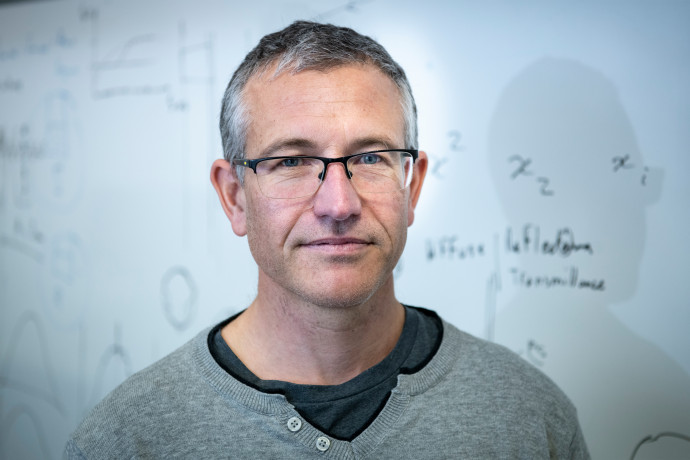2021 Hector Medal: Revolutionising chemical analysis at the nanoscale

Professor Eric Le Ru has been awarded the Hector Medal by Royal Society Te Apārangi for his world-leading research in analytical chemistry at the nanoscale using surface-enhanced spectroscopies.
The Hector Medal is awarded for work of great scientific or technological merit that has made an outstanding contribution to the advancement of the particular branch of science.
Eric’s research is concerned with electromagnetism at the nanoscale. He is a pioneer in the research field of how electromagnetic fields are enhanced around metallic nano-objects, how this changes the interactions between molecules and materials, and how this knowledge can allow molecules to be detected by vibrational spectroscopy techniques. This knowledge is leading to the creation of next-generation biosensors based on new physics and chemistry.
Professor of Physics at Te Herenga Waka—Victoria University of Wellington, Eric is renowned in the fields of surface-enhanced Raman spectroscopy (SERS), single-molecule detection, nano-photonics with a particular emphasis on plasmonics (the study and applications of the optical properties of sub-wavelength metallic objects) and electromagnetic scattering.
SERS uses scattering from nanoscale metallic objects to boost the sensitivity of Raman spectroscopy for chemical analysis. Although discovered 40 years ago, its potential applications are only coming of age now and have the potential to revolutionise analytical chemistry.
Eric's sustained contribution to these fields over the last 15 years, with over 130 publications, span both theoretical and experimental studies and this interplay has been a particular strength of his work. He has written some of the most influential papers in SERS, notably on SERS enhancement factors (he wrote one of the most cited non-review articles in the field), the electromagnetic theory of SERS, and single molecule detection in SERS. The bi-analyte SERS technique he developed to study single-molecule SERS is now used by groups worldwide.
His 2009 book on SERS, a comprehensive research monograph co-authored with Pablo Etchegoin, has become the standard reference for SERS researchers and students around the world.
Eric's work has had an exceptional international impact. This is no minor achievement since SERS currently attracts the attention of thousands of research groups worldwide. He is one of the most highly cited physicists in New Zealand. All his work has been carried out in Aotearoa between 2004 and today, starting in close collaboration with Pablo Etchegoin, until Pablo's untimely death in 2013. The selection panel noted that Eric has put New Zealand on the global stage in these intensely competitive and important fields.
Eric was invited to write a Nature News & Views article (Nature vol. 568, pp. 36-37, 2019) and at the latest international SERS conference in 2019, he was one of two plenary speaks in the opening session with the other speaker being Professor George Schatz (Editor in Chief of the Journal of Physical Chemistry and Member of the National Academy of Sciences).
In 2012 he was awarded the Research Medal of the New Zealand Association of Scientists for outstanding fundamental or applied research in the physical, natural or social sciences published by a scientist under the age of 40 and was awarded a Rutherford Discovery Fellowship by Royal Society Te Apārangi in 2010.
Upon receiving this award, Eric said:
“I am delighted to be awarded the Hector Medal, it is a great honour to be associated with such an illustrious list of past recipients, two of which deserving a special mention here for all the support they have given me: Prof. Sir Paul Callaghan and Prof. Richard Blaikie. I am also grateful for the continuous support I have received from Te Herenga Waka—Victoria University of Wellington, the MacDiarmid Institute of Advanced Materials and Nanotechnology, and Royal Society Te Apārangi. Finally, the work rewarded by this medal wouldn't have been possible without the efforts of many students and my close collaboration with Professor Pablo Etchegoin, my mentor, colleague, and friend, until his untimely death in 2013.”
Award:
The Hector Medal is awarded annually for chemical sciences, physical sciences, or mathematical and information sciences, to the researcher who, working within New Zealand, has undertaken work of great scientific or technological merit and has made an outstanding contribution to the advancement of the particular branch of science.
Citation:
To Eric Claude Le Ru for world-leading research in the fields of surface-enhanced Raman spectroscopy (SERS), single-molecule detection, plasmonics, and electromagnetic scattering.
